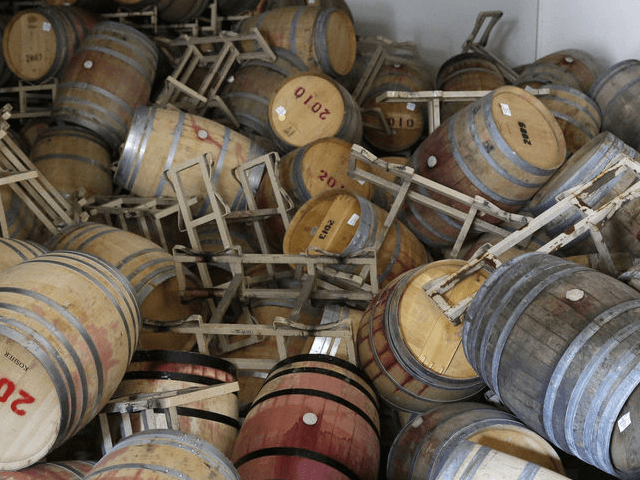Cabernet sauvignon grapes from California’s Napa Valley have been among the most prized on earth for fine wine, justifying the cost per bottle of $100 or more. But it seems that one of the area’s top master blenders for elite brands has been fooling gourmets into paying top dollar for bottles that might really be jug quality wine.
Jeffry James Hill was a legend in Napa Valley for starting out in agricultural pest control and working his way up to becoming a top vineyard manager and blender for such elite priced labels such as Don Sebastiani & Sons, Del Dotto Vineyards and Trinitas Cellars.
But at age 34, he started Hill Wine Company in 2012 by leveraging up to lease a winery along Napa’s fabled Silverado Trail. He became neighbors to such globally famous wineries that included Clos du Val, Stags Leap Wine Cellars, Pine Ridge Winery, Robert Sinskey Vineyards, Rutherford Hill Winery, Duckhorn Vineyards, Casa Nuestra, Rombauer Vineyards, Dutch Henry Winery, Cuvaison Estate Wines and Clos Pegase.
Each weekend the “Trail” attracts busloads of discriminating tourists yearning to learn more about wines and hoping to buy the most prestigious labels at direct prices. Hill’s gift for spellbinding crowds with folksy stories of working at all levels of the business, the New York Times notes, Hill Wine Company at 1001 Silverado Trail became a must-visit location.
Hill achieved such acclaim that Hill Wine Company’s cabernet sauvignon was a featured wine on United Airlines flights that shuttled American athletes and the press to the Winter Olympics in Sochi, Russia.
Despite his newfound fame, Hill was forced to continue working for other members of the Valley buying and selling grapes and bulk wine, and managing fields for big wineries and small growers to pay his own brand’s lease.
The company’s website stated that the vintner was founded in 2008, and that its “Black Dog” brand “only uses Napa Valley fruit that is grown sustainably or organically.”
But the local-boy-does-good hit a rough patch when Hill was arrested and charged with grand theft on March 12, 2014 for allegedly stealing more than $65,000 worth of grapes during the prior fall’s harvest from his client, Del Dotto Napa Valley on Mount Howell and in Oakville.
Hill was charged with diverting 12 bins of Del Dotto and Fleury Vineyards grapes to his own winery. Hill’s attorney, James V. Jones, commented, “At this point, I’m very confident in my client’s case.”
Shortly thereafter, Zenith Insurance Co., a worker’s compensation insurance carrier, filled a civil lawsuit in Napa Superior Court against Hill Wine Co. for unpaid insurance premiums totaling $22,098. Then top-rated vintner Domaine Chandon sued Hill Wine Co. for not paying for $344,640 worth of cabernet sauvignon grapes.
Pushed into bankruptcy, federal agents from the Alcohol and Tobacco Tax and Trade Bureau that oversees the spirits industry placed a “15-inch stack of Manila folders on the table” with 19 allegations of wrongdoing, according to a court filing by Hill Winery’s court-appointed lawyer.
The allegations include accusations of potential civil and criminal violations against Mr. Hill and demand that he surrender his federal licenses to make wine under the names Carneros Vintners, The Ranch and Hill Winery.
The dossier alleges that Jeffry James Hill was never eligible for a vintner’s license because he had an undisclosed 2008 felony conviction for insurance fraud in Sonoma County.
Most important–and perhaps fatal to the value of vintages from elite Napa wineries with which Hill was associated–he is alleged to have falsified federal “5120s” that track the origin of grapes under American Viticultural designations for varietal type and weight.
Essentially, Hill is alleged to have substituted non-Napa county grapes and to have switched cheaper merlot and malbec grapes for the much more expensive Napa cabernet sauvignon grapes provided to his elite contract vineyard customers.
The price of a bottle of wine is usually based on the consumers’ confidence in the superiority of the region’s grapes, the prowess of the blender, and the consistency of the brand. That confidence is now in question, given that Hill managed the fields, blended the varietals and/or traded grapes with many top Napa wineries.
Every time someone opens a $100 bottle of cabernet sauvignon from an elite Napa winery, she will be wondering if the bottle is the equivalent of “Two-Buck Chuck.”

COMMENTS
Please let us know if you're having issues with commenting.